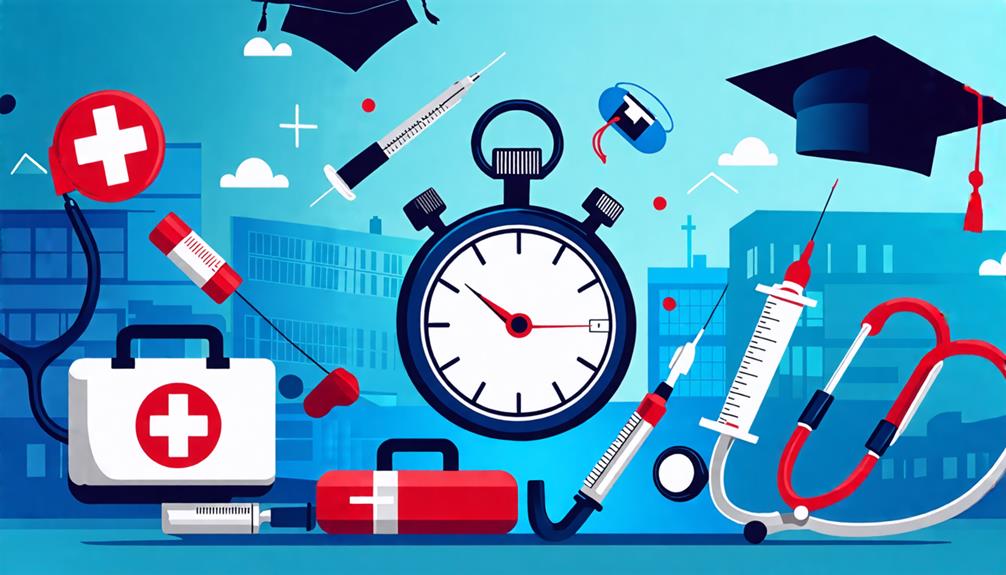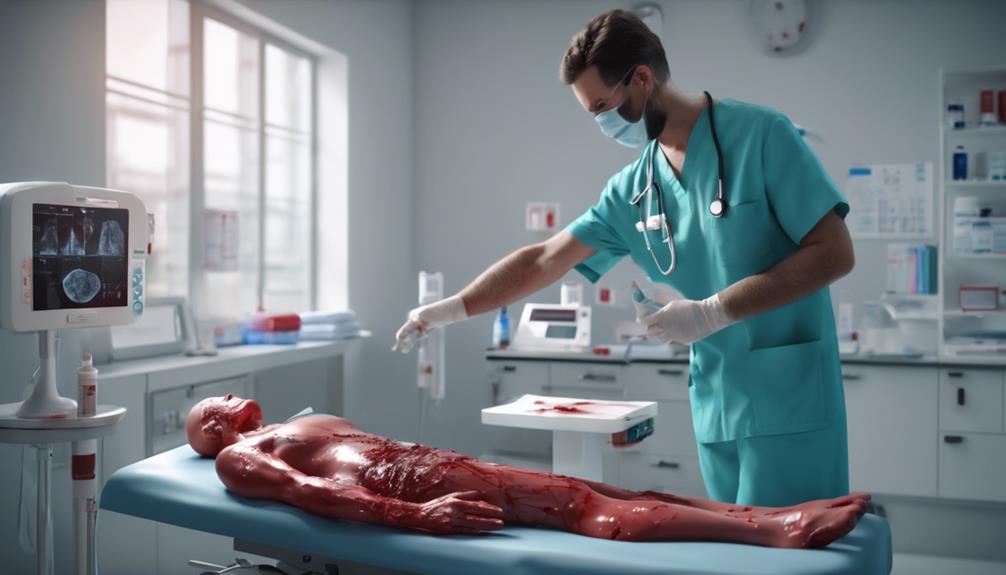
If you're aiming for a quick start in the medical field, consider certificate programs, which offer the shortest schooling options. They last from just a few weeks to a year, focusing on essential skills and hands-on training under seasoned professionals. These programs drill down into specialized areas like phlebotomy or dental assisting, setting you on a fast-track to employment in various healthcare settings. With such a brief educational timeframe, you'll be quickly equipped to jump into your chosen medical role. There's plenty more to explore about how these certifications can specifically tailor to your interests and future career path.
Exploring Certificate Programs

Certificate programs offer a swift path to starting your medical career, focusing on essential skills and practical knowledge. You'll find that these programs typically last from a few weeks to a year, making them an ideal choice if you're eager to enter the workforce quickly. Unlike more extended degrees, certificate programs drill down into specialized areas without the fluff of general education courses.
You might consider a certificate in phlebotomy, where you'll learn to draw blood professionally, or in EKG technology, focusing on heart monitoring techniques. These are just examples; the range of certificates available matches the diversity of roles in healthcare. Each program equips you with the specific techniques and knowledge you need to perform a particular job effectively.
Moreover, the practical nature of the training ensures you're not just learning theory. You'll actively engage in hands-on activities that simulate real-world scenarios, under the guidance of experienced professionals. This direct application of skills builds confidence and competence.
Overview of Diploma Courses
Diploma courses offer a broader scope of training in healthcare, typically extending over one to two years. These programs are designed to equip you with practical skills and theoretical knowledge that are essential in various medical fields. Unlike shorter certificate programs, diplomas delve deeper into specialized areas, preparing you for a more robust role in the healthcare industry.
You'll find that diploma courses can vary widely, depending on the focus and the institution offering them. Common areas of study include practical nursing, dental assistance, and pharmacy technology, among others. Each of these fields requires a hands-on approach to patient care, which is central to the training you'll receive.
Embarking on a diploma course means you're looking at a more comprehensive curriculum that typically includes both classroom instruction and clinical practice. This dual approach ensures that you not only learn the necessary theories but also know how to apply them in real-world settings.
Moreover, the longer duration of study compared to certificate programs allows for a more gradual and thorough understanding of the healthcare profession. This extra time can be vital in helping you build confidence and competence in your chosen field.
The Role of Emergency Technicians

Emergency technicians play a crucial role in the healthcare system, providing immediate care during medical crises. If you're drawn to a career where every second counts, this might be the path for you.
As an emergency technician, you'll often be the first healthcare professional patients encounter during an emergency. This means you're not just a caregiver; you're a lifeline for patients in critical times.
You'll need to be prepared for anything. From heart attacks and car accidents to childbirths in unexpected settings, your shifts will be unpredictable and demanding. It's your job to stabilize patients until they can reach a hospital or receive more specialized treatment. This involves administering emergency medical treatments, performing CPR, and using medical equipment like defibrillators.
The pressure is high, but so is the reward of saving lives. In your role, you'll also comfort those in distress, making human connections that are deeply impactful. Remember, your ability to remain calm and collected can make all the difference in someone's survival.
This career doesn't require extensive schooling—a diploma or certificate program, typically lasting less than two years, can start you on this fulfilling path. You'll also undergo hands-on training to equip you with the skills needed for this intense yet rewarding job.
Becoming a Dental Assistant
If you're seeking a medical career with a shorter educational path, consider becoming a dental assistant. This role offers you a unique blend of clinical and administrative responsibilities, directly supporting dentists and enhancing patient care.
Typically, you'll need to complete a dental assistant program, which can take anywhere from nine months to two years, depending on whether you pursue a certificate, diploma, or associate degree. Many of these programs are offered at community colleges, technical schools, and even some universities. Plus, they include both classroom learning and hands-on training, preparing you for the real-world environment.
Certification requirements vary by state. Some states require licensure or registration, which might involve passing an exam like the Certified Dental Assistant (CDA) exam offered by the Dental Assisting National Board (DANB). Others may only require on-the-job training, supervised by a licensed dentist, without formal education.
In your role, you'll perform tasks such as preparing patients for treatments, sterilizing instruments, taking dental impressions, and assisting with administrative duties such as scheduling and billing.
This career not only offers a quick entry into the healthcare field but also provides a stable job outlook and opportunities for advancement.
Pursuing a Career in Phlebotomy

Considering a swift entry into the medical field, you might explore a career in phlebotomy, where training can be completed in a relatively short period. As a phlebotomist, you'll specialize in drawing blood, a crucial role in medical diagnostics. Training programs often range from four to eight months, including both classroom learning and practical experience.
You'll start with courses in anatomy, physiology, and medical terminology, crucial for understanding how to interact safely and effectively with patients. Hands-on training will teach you the techniques for drawing blood, handling specimens, and following strict health and safety protocols. You'll also learn about patient interaction and data management, skills that enhance your professionalism and efficiency.
Certification isn't always mandatory, but it's highly recommended to boost your job prospects. Organizations like the National Phlebotomy Association offer a certification exam that you can take after completing your training. This certification not only increases your credibility but also demonstrates your dedication and skills to potential employers.
Once certified, you'll find opportunities in hospitals, diagnostic laboratories, blood donor centers, and private healthcare practices. With the healthcare industry growing, your skills will be in high demand, making phlebotomy a promising and stable choice for your medical career.
Medical Coding Specialist Pathway
Another quick route into the medical field is training as a medical coding specialist, which can be completed in just about a year. You might find this career path intriguing if you're keen on the administrative side of healthcare, where you'll handle essential data that impacts patient care and medical facilities' operations.
As a medical coding specialist, you'll learn to translate medical procedures, diagnoses, and equipment into universal medical alphanumeric codes. This coding is crucial for billing insurance companies, managing patient records, and ensuring the smooth operation of medical facilities. You'll need keen attention to detail and a strong grasp of anatomy, physiology, and medical terminology.
Training programs are readily available at community colleges, vocational schools, and online platforms. They usually range from certificate programs that you can complete in a year to more comprehensive associate degree programs that might take up to two years. Look for accredited programs that meet industry standards to ensure you're getting quality education that employers will respect.
Once you've completed your training, you'll likely need to pass a certification exam, such as the Certified Professional Coder (CPC) exam offered by the American Academy of Professional Coders (AAPC). With certification, you're set to start your career in various healthcare settings.
Opportunities as a Pharmacy Technician

Exploring a career as a pharmacy technician offers a swift entry into the healthcare field, typically requiring less than two years of education. As a pharmacy technician, you'll work under the supervision of a licensed pharmacist, handling critical tasks like dispensing prescription medications and managing customer inquiries. This role is crucial in maintaining the efficiency and accuracy of pharmacy operations.
You'll find that your duties aren't just limited to counting pills and labeling bottles. You'll also manage inventory, process insurance claims, and use technology to track medication distribution. This diverse skill set ensures that every day is different, providing you with a dynamic work environment.
Moreover, you can work in various settings—retail pharmacies, hospitals, and even mail-order pharmacies. Each setting offers distinct experiences and challenges, broadening your career prospects. The flexibility to switch between environments based on your career goals and life changes is a significant perk.
Certification requirements vary by state, but most require you to pass an exam, and some might need formal education or training. Once certified, you're set to enter the workforce, equipped with the knowledge and skills to make an immediate impact. This quick pathway into healthcare lets you start your career without the lengthy and costly education required for other medical professions.
Advantages of Associate Degrees
Associate degrees offer a quick, cost-effective route to a medical career, providing comprehensive training in just two years. You'll find that these programs not only save you time but also significantly reduce your educational expenses compared to bachelor's degrees. This can be a crucial factor if you're eager to start working without accumulating substantial debt.
With an associate degree, you're positioned to enter the workforce swiftly. Fields like radiologic technology, dental hygiene, and nursing are accessible through these programs, allowing you to begin earning and gaining practical experience sooner. This hands-on experience isn't just a job; it's a stepping stone, providing you with valuable insights and real-world skills that are highly sought after by employers.
Moreover, you're not limited in your career by starting with an associate degree. Many healthcare positions recognize and reward the foundational knowledge and skills you've acquired.
Plus, if you decide to further your education, your associate degree can often be transferred to earn a bachelor's degree, offering you flexibility and advancement opportunities without starting from scratch. This educational path ensures you remain adaptable and competitive in the dynamic field of healthcare.
Frequently Asked Questions
What Are the Typical Hours for Medical Career Training Programs?
You'll find that medical career training programs typically run between 20 to 40 hours per week, depending on the intensity and the specific requirements of the program you're enrolled in.
Are Online Medical Training Programs Credible and Effective?
You might wonder if online medical training programs are credible and effective. Many are accredited and offer robust curricula, but it's essential to verify their accreditation and check reviews before committing.
How Soon Can I Start Working After Completing Training?
You can start working soon after you complete your training, depending on the program and state requirements. Some positions may require additional certification or licensing tests before you're eligible to begin working.
What Are Common Challenges Faced in Medical Training Programs?
You'll face rigorous academic demands, high stress levels, and intense practical assessments in medical training programs. Balancing personal life with demanding schedules and mastering complex material quickly are common challenges.
Is Financial Aid Available for Short-Term Medical Courses?
Yes, you can find financial aid for short-term medical courses. Many institutions offer loans, scholarships, and grants specifically designed to help students manage costs for these accelerated training programs. Explore your options thoroughly.
Conclusion
You've explored various paths to enter the medical field quickly. Whether it's becoming an emergency technician, a dental assistant, a phlebotomist, a medical coding specialist, or a pharmacy technician, each offers a unique opportunity with minimal schooling.
If you're leaning towards a slightly longer educational commitment, consider an associate degree. Whichever path you choose, you're on your way to a rewarding career in healthcare, helping others and making a significant impact in your community.






